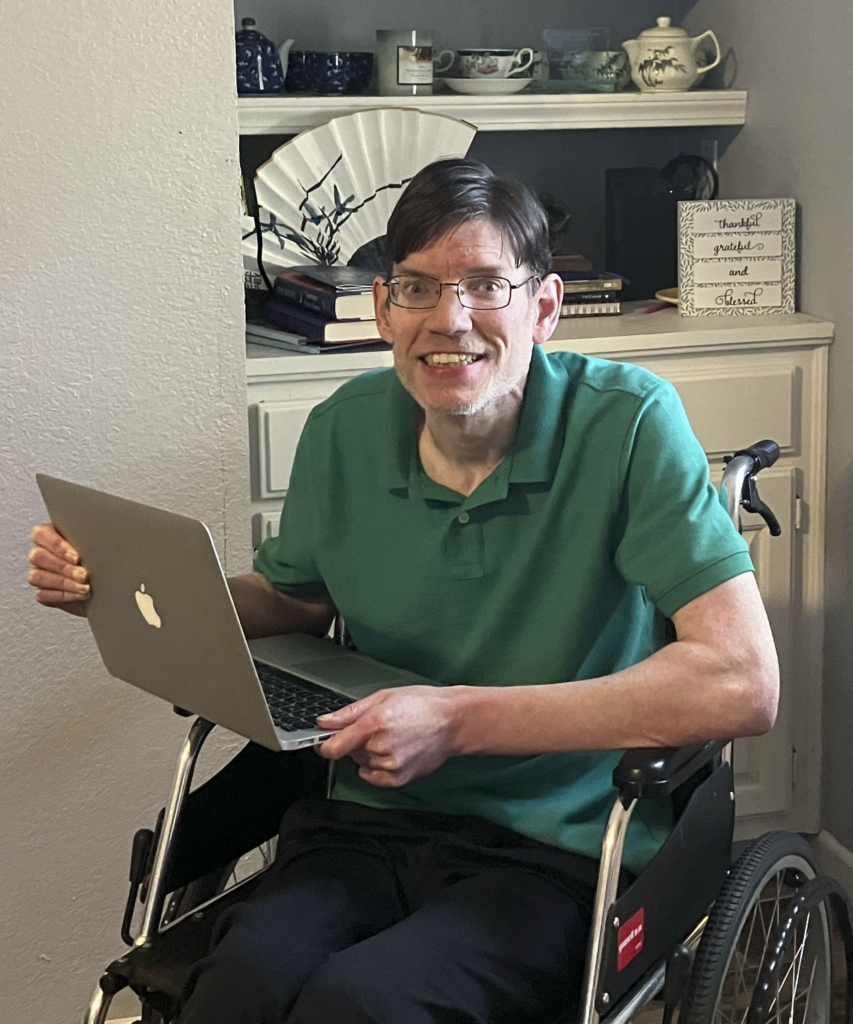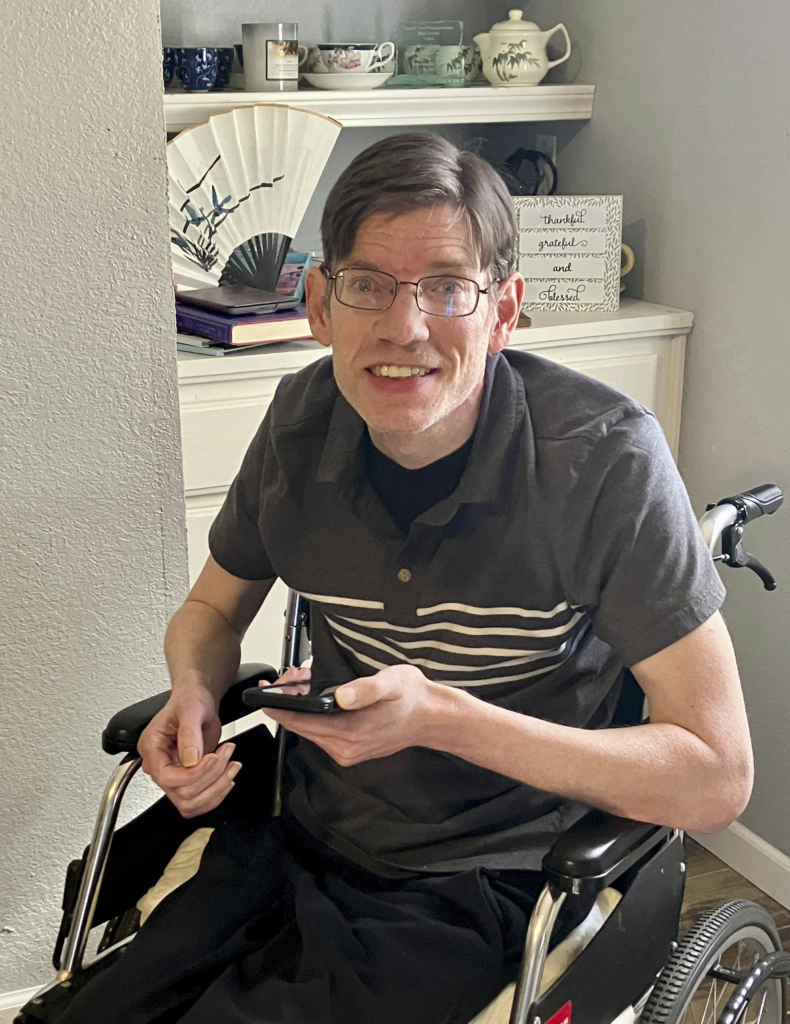Homebound Missions

My heart plunged the first time I heard it spoken, but I knew it to be a true assessment. At the church where I serve as a resident missionary, my name had been added to the homebound list. Worse, I continue to be on that list, more than a year later. I never imagined this would become my new reality, at least not yet—not in my 40s—but here I am, at home, sitting in a wheelchair like every other day of the week. It’s not that my health was doing well when my family and I moved back to the United States from Asia in 2020. I had already begun using a wheelchair. This was especially the case at the airport where I needed to travel long distances quickly.
However, nerve damage from multiple sclerosis (MS) has become much worse since then.Leaving my house has become a major event. Even when I am at home, I need help throughout the day, especially as the day progresses. I’m typically stronger in the morning, but I often need help by the evening because of increased inflammation, which further diminishes strength. It is not uncommon for me to struggle to eat dinner without assistance. Every day, I need help to get on the bed and then the next morning to get back into the wheelchair. These years have been a crash course into dying to self, and my struggles cause much grief regarding my family. I am unable to take my wife on a date. It’s difficult for me to be involved with my kids’ lives, both of whom are currently in high school. I pray for them often, but I seldom can do things with them. In addition, this new reality has deeply impacted my ability to minister.
I have been involved in some form of ministry since I was a teenager. In 1990 as a ninth grader, I took a course called Prayer Life. It was life changing. When I was praying for the Lord to send harvesters out to the mission fields, my prayers seemed to fall back onto myself. After a few days of this, I realized that the Lord was calling me to take his love and message to the nations. I was eager to live out this calling. Ministering in Poland and briefly in Venezuela was amazing, and the years my family and I served in Asia were such a joy. Now, though, how in the world or more accurately, how in the home could I possibly continue doing ministry across the nations? Homebound missions?
“Lord God,” I prayed, “I know that all things are possible for you, but what kind of ministry can I possibly do? God, I’m homebound.”
I looked up but with sadness. I did not want to doubt or complain, but the idea of homebound missions just seemed unattainable, if not a ridiculous pipe dream. My hope was to be a man of faith and joy and love—a man who continually blesses family and friends. I wanted to bless others across the nations. I wanted to preach and teach. True, I was thankful I could still write and edit, especially because of the friendships made during such service, and I was thankful to lead Prayer for the Nations on Zoom each week.
As I have often expressed, the best thing about being in a wheelchair is: I can pray. It is such a joy to pray for and with others, to be able—because of the Lord’s great mercy—to enter his throne room with confidence.
Certainly, though, I have missed serving overseas. I have missed being able to develop and deepen friendships across Asia and Africa and across the United States for that matter. I knew that God could heal me—and I would certainly welcome such intervention now—but I also knew that he would give me the strength to serve, whether or not I was still suffering from MS nerve damage. Disabled or not, I wanted my body to be a living sacrifice of holy worship, as Romans 12:1 prescribes. Also, I wanted to be a man who would always worship the Lord in spirit and truth, with love and joyful hope. This is what I wanted most of all.
Often, though, I was dealing with frustration and pain. Discouragement was always crouching at the door. I imagine that many of us affected by disability face this temptation of discouragement. No form of suffering is easy. These years, this area of being discouraged or frustrated has been my biggest temptation. Also, when I first memorized 1 Corinthians 10:13 as a teenager—with Jesus offering to help us endure temptations without sinning—I wasn’t thinking about a temptation to complain. Nonetheless, this is another area where we may be vulnerable. Complaining is certainly warned against in 1 Corinthians 10:10, and we will shine like stars in the sky if we do not grumble (Philippians 2:14-15).
Sometimes, I responded well when dealing with various trials, like the time I praised the Lord for an hour as I waited for help. However, there were many occasions when I did not respond well. I am grateful for mercy—mercy from the Lord and mercy from my family. I had to learn that my best defense was to fill up my heart with what is excellent and praiseworthy. I needed to saturate my heart with the Word of God.
As Jesus explains in Matthew 12:34 and Luke 6:43,“… the mouth speaks what the heart is full of.” When Psalm 23:6 says, “Surely goodness and mercy will follow me all the days of my life,” I believe this is because our hearts are filled with goodness and mercy. When struggles come, goodness and mercy will splash out, leaving such mercies behind us.
During these months, the Lord was doing much work behind the scenes—of which I am grateful. The Lord is so good! I thought the idea of reaching the nations from home was nowhere near a possibility, but in fact, in the days following COVID, virtual ministry was and still is quite possible. This is exactly the ministry to which the Lord was leading me. Such joy! I began to become friends with those like Ben Watson. Ben is physically blind, but his visual impairment has nothing to do with his spiritual insight. He certainly has been a godsend. For nearly an hour, Ben met with me over Zoom to share about how we—two ministers both dealing with a disability—could multiply disciple-makers across the nations, even from home.
I was thrilled to learn about this ministry, which is called Internet Theological Education by Extension (iTEE) Global. In addition to extending services to disciple and train students with disabilities, iTEE Global offers a virtual platform for pastors—even those with a profound physical disability, needing more assistance than merely a cane or wheelchair. Here was such an amazing opportunity before me. From home, I could train various cohorts as a facilitator, help lead global prayer summits or offer devotions to other staff members. I would also be able to partner with Ben to further advocate for those with disabilities. Few ministries are trying to disciple such individuals, much less trying to multiply disciple-makers among those with disabilities. With excitement, I pursued an interview and later became a volunteer missionary (like all the other iTEE Global missionaries, who raise their own support).

As strange as it may sound, I am now a homebound missionary. It takes my title of missionary in residence to another level. What joy it has been to pray with ministers around the world. Whether on a monthly, weekly, or sometimes even daily basis, I have been praying with pastors who live in Sierra Leone, the Dominican Republic of Congo, India, Guatemala, and Canada. I have even been able to join a few of these pastors (via their phones) to go out and pray with church members, even in mountainous areas like in Sierra Leone where homes only have dirt flooring. To be able to extend the love of Christ to the nations—despite physical hardships—has been such a wonderful gift. I can only say: Thank you, Jesus.
-Written by Kevin Avery

Disability in Mission
Disability in Mission: The Church’s Hidden Treasure outlines a radical change in approaches to missiology, missions, and praxis for the twenty-first-century global cultural context. It explores a pattern whereby God works powerfully in missions through disability and not in spite of it.





